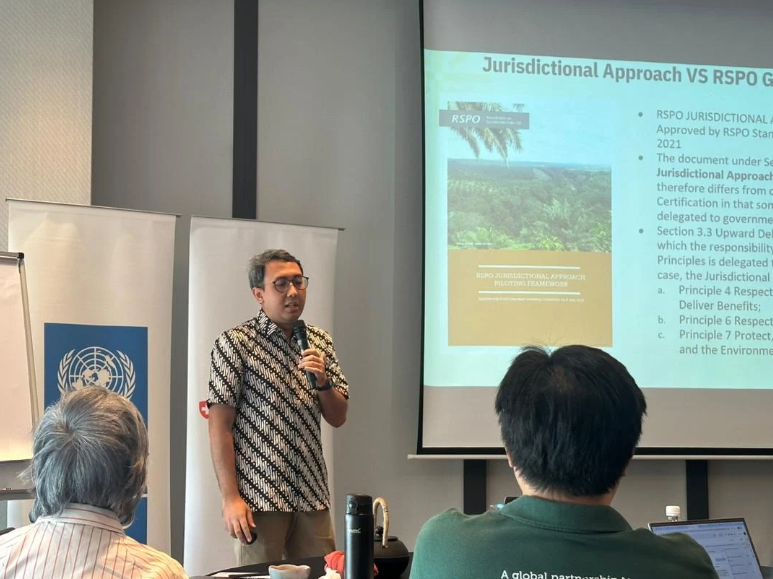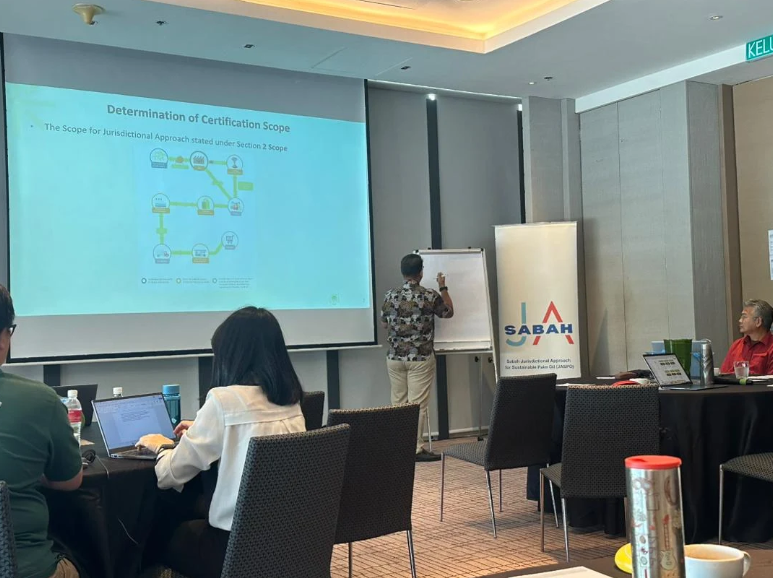The Jurisdictional Approach (JA) is one of RSPO’s most innovative strategies to scale sustainable palm oil production. By engaging governments, companies, smallholders, and civil society in a collective framework, the JA aims to certify entire political or administrative regions, rather than individual producers, through a structured Stepwise Approach.

Sabah, located in Malaysian Borneo, is one of three official Jurisdictional Approach (JA) pilots globally, alongside Seruyan (Indonesia) and Ecuador. With its ambitious commitment to sustainable palm oil, Sabah has become a model for how multistakeholder collaboration can address complex sustainability challenges at scale.
Building on a Strong Foundation
Building on the ongoing RSPO Jurisdictional Approach pilot in the Sabah region, the UNDP, and Jurisdictional Approach System for Palm Oil (JASPO) have provided technical and strategic support. Their involvement complements Sabah’s multi-stakeholder efforts and contributes to advancing sustainability, highlighting technical achievements and long-term vision.
- At RT2024, RSPO’s annual flagship event in Bangkok, Sabah’s JA efforts were showcased internationally, reinforcing the state’s leadership role in driving sustainable palm oil.
- In May 2025, a virtual forum deepened dialogue between global stakeholders, highlighting the collective progress and challenges in scaling the JA.
- In August 2025, the collaboration was strengthened further through the second Internal Control System (ICS) Workshop in Sabah.
This series of events reflects not only steady progress but also a growing recognition that jurisdictional certification requires a united front across technical, political, and market arenas.

Moving Forward in Sabah
Recently, in August 2025, the RSPO, the UNDP and JASPO, carried out the second Internal Control System (ICS) Workshop in Sabah. This milestone marked another important step in preparing the Jurisdictional Entity (JE) for certification, aligning regulatory frameworks with RSPO and MSPO standards, and clarifying certification pathways for different actors, including smallholders, growers, and supply chain members.
The workshop brought together a wide range of technical and implementation partners, such as WWF Malaysia, the Sabah Forestry Department (SFD), Forever Sabah, MSPO, and members of the Jurisdictional Certification Standing Committee (JCSC). Their participation ensured that discussions reflected diverse perspectives, from conservation and regulatory enforcement to smallholder realities and certification expertise. Key areas of focus included the Land Use Change Analysis (LUCA) and the Remediation and Compensation Procedure (RaCP) from a jurisdictional perspective.
Given the scale and complexity of applying these requirements across Sabah, participants explored alternative models that recognize existing state conservation commitments and the principle of upward delegation. Discussions highlighted that Sabah’s strong conservation policies and protected areas could potentially provide a foundation for meeting RSPO’s requirements differently from the conventional model, while still maintaining robustness and integrity.
Another critical point of discussion was the business case for JE membership. Participants acknowledged the long-term benefits of the JA approach such as improved market credibility, greater access to international buyers, and more efficient compliance.
Looking Ahead
The road toward jurisdictional certification in Sabah is ambitious, but the momentum is clear. With continued collaboration between the RSPO, the UNDP and JASPO supported by government agencies, industry players, and civil society, Sabah is steadily advancing toward Step 2 of the JA Piloting Framework.
Looking ahead, partners are planning a field visit to Sabah in November 2025, organized by RSPO, UNDP, and JASPO around the time of RT2025. The visit is designed to strengthen collaboration, showcase progress on the ground, and provide a platform for knowledge exchange and stakeholder engagement, while remaining separate from the official RT2025 program.
Sabah’s leadership in piloting a jurisdictional approach to certification shows how sustainability can be scaled beyond individual actors, toward entire landscapes.
By advancing jurisdictional certification, Sabah is not only addressing pressing environmental and social challenges but also laying the foundation for a sustainable palm oil future that benefits producers, communities, and ecosystems alike.
To learn more about the Jurisdictional Approach, please visit our website or contact [email protected].
Keep reading

Advancing Jurisdictional Certification in Sabah: Strengthening Collaboration Between RSPO, UNDP, and Jurisdictional Approach System for Palm Oil (JASPO)
Call for Expression of Interest: Independent Investigation of a Complaint

Leading Labels: RSPO Among Top Sustainability Labels in Dutch Market

The 21st International Oil Palm Conference Successfully Took Place in Cartagena, Colombia

Top Performers of the 2025 Shared Responsibility Scorecard

ACOP 2024: RSPO Market Trends Resilient Despite Global Challenges

RSPO: Actions for the Certification of Sustainable Palm Oil Production




